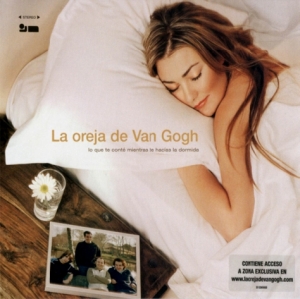Azúcar Moreno is a Spanish music duo composed of sisters Antonia "Toñi" and Encarnación "Encarna" Salazar. The duo has sold more than three million albums and singles since 1984 domestically, and became famous in Europe, the United States and Latin America in the 1990s, with approximately twelve million albums sold worldwide.
Magneto was a popular Mexican boy band of the 1980s and 1990s. The band formed on February 14, 1983. In 1986, Magneto was featured in "Siempre en Domingo," a Mexican entertainment show viewed across Latin America and parts of Europe. Mexican teen pop group Magneto emerged in 1983. Their first record, Dejalo Que Gire came in 1984, followed by Super 6 Magneto. The Latin pop outfit suffered several lineup changes before achieving their first gold record in 1986. Mostly playing dance-pop songs, the five-member ensemble started touring Central America after climbing charts with "Todo Esta Muy Bien," and "Soy Un Soñador." However, their breakthrough came after issuing a Spanish-language version of Desireless' "Voyage, voyage," a French pop hit from the '80s. In 1992 the boy band played the lead in their own movie, Cambiando el Destino. Magneto won the Lo Nuestro Award for Pop New Artist of the Year, and received two nominations for the Lo Nuestro Awards of 1993: Pop Album (Magneto) and Pop Group of the Year. Nevertheless, the original Magneto disbanded in 1996 after a sold-out show at Mexico City's Auditorio Nacional.

Cristian Sáinz Castro is a Mexican pop singer. He is the son of actors Verónica Castro and Manuel "El Loco" Valdés, and nephew of actors Ramón Valdés and Germán "Tin-Tan" Valdés. Castro has sold over 12 million copies, making him one of the best-selling Latin music artists of all-time.

Tatiana Palacios Chapa, known mononymously as Tatiana, is an American-born Mexican actress, singer and television presenter. Referred to as the "Queen of Kids", she has been nominated for five Latin Grammy Awards for Best Children's Album and has sold over 9 million records.

Héctor Eduardo Reglero Montaner, better known as Ricardo Montaner, is an Argentine-born Venezuelan singer. Since starting his career in the late 1970s, he has released more than 24 albums, and many successful singles. He has sold an estimated 10 million records worldwide, making him one of the best-selling Latin music artists.

Lo que te conté mientras te hacías la dormida is the third studio album of Spanish band La Oreja de Van Gogh. It was released on April 28, 2003, through Sony Music Entertainment label. It is the band's best selling work internationally. It has also been certified as one of the best selling albums of all time in Spain. In France the album was released under the name of París, containing a mix of songs from this album and the previous one.
Eduardo Capetillo Vásquez is a Mexican actor and singer.
Mexican pop is a music genre produced in Mexico, particularly intended for teenagers and young adults.

Los Amigos Invisibles is a Venezuelan band which plays a blend of disco, acid jazz and funk mixed with Latin rhythms. In addition to releasing eleven critically acclaimed albums, the band have been lauded internationally for their explosive, live shows, spanning nearly 60 countries. They are considered the Venezuelan band with the greatest international recognition.

"¿Dónde Estás, Corazón?" is a song by Colombian singer-songwriter Shakira, included in the various artists compilation album Nuestro Rock Volumen II (1994) and her third studio album Pies Descalzos (1995).

José Martín Cuevas Cobos, known by his stage name Pedro Fernández, is a Mexican singer, songwriter, actor, and television host. Fernández began his international career as Pedrito Fernández at the age of seven.

Zoé is a Grammy Award and Latin Grammy Award-winning Mexican rock band. It was initially formed in Cuernavaca, Mexico in 1994, although membership started to stabilize in 1997. The band has achieved success in Mexico and most Spanish-speaking countries with albums such as Rocanlover, Memo Rex Commander y el Corazón Atómico de la Vía Láctea and Reptilectric.
"La gota fría" is a 1938 Colombian vallenato song, composed by Emiliano Zuleta. It has been proposed as an unofficial Colombian anthem. The song emerged from a musical controversy with Lorenzo Morales. Many artists had covered the song include Carlos Vives, Grupo Niche, Ray Conniff, Gran Pachanga, Los Joao, La Sonora Dinamita, Julio Iglesias, Tulio Zuloaga, and Alfredo Gutiérrez. The title of the song alludes metaphorically to the weather phenomenon, in which a cold front clashes with warm air, producing heavy storms and torrential rains; the cold drop is occasionally apparent near the Sierra Nevada de Santa Marta.

King África is an Argentine dance music project that caught interest in 2000 due to the remake of their own 1993 song "Salta", and also for their cover version of "La Bomba" by the Bolivian group Azul Azul. It was founded in the early 1990s by DJ Martin Laacré.

Vivo is the third live album by Mexican singer Luis Miguel. It was filmed at the Auditorio Coca-Cola concert hall in Monterrey, Mexico, where Miguel performed from 13 to 17 April 2000, as part of the second leg of his Amarte Es Un Placer Tour. Vivo was released in a live audio CD, DVD and VHS format. Vivo is the first Spanish-language live album to be released on NTSC, PAL, and DVD formats. The audio version was produced by Miguel while David Mallet directed the video album. The audio disc was released on 3 October 2000, while the video album was released on 24 October. Miguel's renditions of "Y" and "La Bikina", which he specifically performed during the concert shows in Mexico where he was joined by Cutberto Pérez's band Mariachi 2000, made available as singles for the album.

Flavio Enrique "Kike" Santander Lora is a Colombian-American composer, record producer, arranger and entrepreneur. He is considered to be one of the principal Latino composers of the day, having worked with artists such as David Bisbal, Cristian Castro, Thalía, Chayanne, Natalia Oreiro, Diego Torres, Davi Wornel, Alejandro Fernández, Olga Tañón, Bacilos, José Luis Rodríguez «El Puma» and Gloria Estefan among others. Santander has composed more than 710 songs and has sold over 25 million albums worldwide. His work as songwriter and producer includes themes such as Let's Get Loud by Jennifer Lopez, Abriendo puertas by Gloria Estefan, Me Estoy Enamorando by Alejandro Fernández, Mi Vida Sin Tu Amor by Cristian Castro, and Premonición by David Bisbal, as well as many songs recorded by artists such as Thalía, Natalia Oreiro, Gisselle, Edith Márquez, Luis Miguel, Soledad Pastorutti and the Spanish song for Eurovision Song Contest 2004, amongst others.

"La Bomba" is the debut single released by Bolivian band Azul Azul. The song reached #1 on the Billboard Top Latin Songs and Billboard Tropical Songs charts.

Juan Manuel Magán González is a Spanish producer, singer, remixer and DJ of electronic dance music, recognized internationally for his contributions to the "Electro Latino" category of music.
"La Media Vuelta" is a song written and performed by Mexican singer José Alfredo Jiménez released in 1963. One of Jiménez' most famous compositions, the song has become part of the traditional Mexican musical repertoire, and has been recorded by dozens of singers and groups.
"Todo y Nada" is a song written and performed by Mexican singer Vicente Garrido Calderón released in 1957 and originally recorded by Los Tres Ases and Lucho Gatica. It was covered by Mexican singer Luis Miguel on his album Segundo Romance (1994) where it was released as the third single from the album in 1995 and reached number three on the Billboard Hot Latin Songs and number one on the Latin Pop Airplay charts, becoming his third number-one song on the latter chart. "Todo y Nada" became Miguel's third consecutive number-one song from Segundo Romance in Mexico; and became a top-five hit in Chile, Panama and Puerto Rico.












